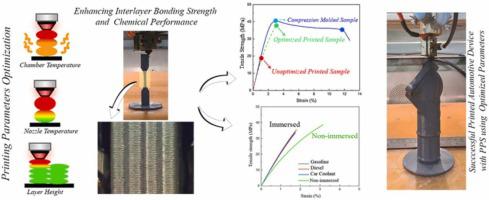Additive Manufacturing ( IF 10.3 ) Pub Date : 2022-04-15 , DOI: 10.1016/j.addma.2022.102780 Mohammad M. Garmabi 1 , Peyman Shahi 1, 2 , Jimi Tjong 1 , Mohini Sain 1, 2

|
Weak interlayer bond strength caused by layer-by-layer production in fused filament fabrication (FFF) restricts the application of this manufacturing method in load-bearing parts. The interlayer bond strength can be enhanced through the proper selection of 3D printing parameters that affect the thermal history within the interface. In this study, the effects of nozzle temperature, chamber temperature, and layer height on interlayer bond quality of polyphenylene sulfide (PPS) 3D printed parts were investigated using response surface methodology (RSM). Tensile test samples were fabricated with the layers perpendicular to the testing direction, and nozzle temperature and layer height were found to be the most important parameters affecting bond strength. The interlayer bonding quality was significantly enhanced through optimization of parameters as the 3D printed parts reached the tensile strength tensile stress and Young's modulus of 93% and 96% of compression molded PPS parts, respectively. Chemical resistance tests were also performed on the 3D printed parts, and the samples showed less than 1% weight increase and 5% decrease in tensile strength after two weeks of immersion in automobile chemicals suggesting the promising performance of the parts for under-the-hood applications in the automotive industry.
中文翻译:

聚苯硫醚 3D 打印通过增强层间粘合用于功能性轻量化汽车部件制造
熔丝制造(FFF)中逐层生产导致的层间粘合强度较弱,限制了这种制造方法在承重部件中的应用。可以通过正确选择影响界面内热历史的3D打印参数来增强层键强度。在本研究中,使用响应面法 (RSM) 研究了喷嘴温度、腔室温度和层高对聚苯硫醚 (PPS) 3D 打印部件的层间粘合质量的影响。拉伸测试样品制作成层与测试方向垂直,发现喷嘴温度和层高是影响粘合强度的最重要参数。由于 3D 打印部件的拉伸强度、拉伸应力和杨氏模量分别达到压缩成型 PPS 部件的 93% 和 96%,因此通过参数优化显着提高了层间粘合质量。还对 3D 打印部件进行了耐化学性测试,在汽车化学品中浸泡两周后,样品的重量增加不到 1%,拉伸强度降低了 5%,这表明引擎盖下部件的良好性能在汽车行业的应用。

































 京公网安备 11010802027423号
京公网安备 11010802027423号